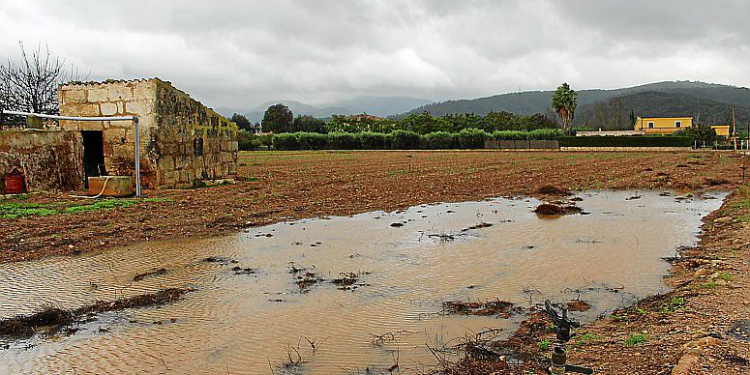In general, the peasants value rainfall positively since they have recharged the aquifers
It never rains to everyone’s liking, although this time it seems that most farmers are satisfied with the rainfall that the storm Blas has left in the fields of the Island. The point that worries most right now are some ‘marjals’ of sa Pobla that they have been forced to paralyze the campaign of planting of potatoes destined to the export. This may also imply a delay in the subsequent harvest.
Joan Company, head of s’Esplet, assures that since last Saturday they have had to stop the cultivation process, so the work is delayed according to the planned schedule. In addition, Company also confirms that there are some flooded farms that have not been able to collect the late winter potatoes “since these days it has rained more than 100 liters in sa Pobla and there are some flooded lands”, emphasizes Company. Despite this, the person in charge of s’Esplet points out that at times the plants withstand the rainfall and that the problem would come if these are prolonged in time, since they could cause the tuber to be lost.
For now, Company is cautious about the evolution of the harvest and satisfied that “finally the aquifers have been regenerated and the land has been able to be watered.” “We have had very little rainfall for a year, these rains were very necessary,” he says. For his part, from Mateu Export, Joan Mateu confirms the momentary stoppage of potato cultivation for export, although in his case, they had already started 10% of planting.
Joan Mateu, likeCompany, highlights the water deficit in the sa Pobla area, so “these rains are well received.” However, he emphasizes that the crops can be affected by the gusts of wind that were registered last Saturday night and that have affected the potato plantations. Now they are waiting for the assessment that the agricultural insurance can make.
THE HISTORY OF MATEU EXPORT
Some scholars say there are no matches in history. However, all along the evolution process of humankind, certain significant events seem to have happened on a suspiciously recurring basis.
Thus, two human epics and a commercial endeavor had to coalesce so that the potato grown in the municipality of Sa Pobla could achieve its present quality and international renown.
Thanks to the colossal draining works of part of the Albufera (lagoon) carried out by two Englishmen -JLBatteman and Green- in the late XIXth century, Sa Pobla’s men and women of the early XXth century were able to break up the land and dig hundreds of wells. With the water obtained through their unflagging labor, they turned the dry terrain into an irrigation land.

This magnificent and vast land, achieved by two enlightening examples of the struggle of humankind agaist geographic difficulties, was now ready for the third factor, the arrival of the British Royal Kidney potato, whose production started Sa Pobla’s great commercial export adventure.
The municipality of Sa Pobla is located in the north-east section of the island of Mallorca. Most of its 48.53 Km2 are flat. The soil is mostly made up of quaternary alluvium sediments brought in by the streams of Saint Miquel, in the north-east, and Ampliadrà, in the south-east. The village is situated at an altitude of 36 meters above sea level.
Sa Pobla, formerly known as La Puebla, was declared Royal Village by King Jaime II in 1300, during the population planning of the island. Since then, Sa Pobla has been a farming village.
In the early XXth century, local potato growing increased significantly due to exports to the United Kingdom. The Royal Kidney variety, which came from the Maresme lands in Catalonia, was introduced in Sa Pobla in 1924. On that same year, 25 tons of potatoes were exported to Liverpool. In 1925, as a consequence of the promising export prospects, 200 tons of seeds were sown in a total surface of 70 hectares, which yielded 1000 tons of potatoes. 1000 tons of Royal Kidney seeds were imported in 1929. During the 1960’s, 85% of Sa Pobla’s 15,000-ton potato production was exported to the UK.

Potato growing in Sa Pobla has undergone a constant improvement process, both in terms of irrigation techniques and sanitary issues. New potato varieties have been grown in recent years in order to meet demand, since, in addition to the UK, export destinations now include Sweden, Denmark, The Netherlands and France.
The undisputed quality of the Sa Pobla potato is the result of the farmers’ meticulous and caring work. Potato growing techniques in Sa Pobla have been handed down from one generation to the next. The Sa Pobla farming families inject love, tradition, quality and modernity in their work. Each rut of the land is filled with history and anonymous sweat.
The result is one product, the Sa Pobla potato, that has no match.







